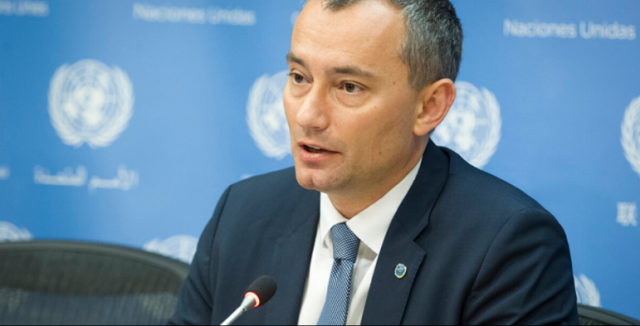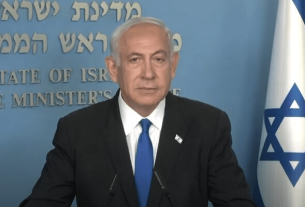A new tune from the Middle East Quartet

by Neville Teller
On February 3, UN Secretary-General Antonio Guterres said that now there was a new US president in the White House, he hoped to see the Middle East Quartet reconvene “in the next few weeks”. Sure enough on February 15 the Quartet, comprising envoys from the UN, the EU, the US and Russia, held its first meeting since September 2018. Afterwards the Russian embassy in Israel tweeted that the four envoys “emphasized the importance of creating all necessary conditions for the earliest resumption of direct Israeli-Palestinian negotiations.”
Tor Wennesland, UN special coordinator for the Middle East peace process, tweeted: “The envoys agreed to meet on a regular basis to continue their engagement.”
The #MiddleEast Quartet Envoys from #Russia, #USA, #EU & #UN met virtually today to discuss the latest political developments and situation on the ground. The Envoys agreed to meet on a regular basis to continue their engagement.
— Tor Wennesland (@TWennesland) February 15, 2021
Established in 2002, the Quartet’s mandate was “to help mediate Middle East peace negotiations and to support Palestinian economic development and institution-building in preparation for eventual statehood”. Over the years, its mandate seems to have been turned on its head. The first part has been swamped by the latter.
Tony Blair took up the role of Representative of the Middle East Quartet on the very day he resigned as UK Prime Minister ‒ June 27, 2007. To support his work, the Office of the Quartet Representative (OQR) was established. When Blair left the post In May 2015, the OQR transitioned to the Office of the Quartet (OQ), reporting directly to the Quartet envoys.
On its official website the OQ’s main purpose now differs significantly from the original mandate. Augmented by a definition of a future Palestinian state ‒ the very issue that would be the subject of any future peace negotiations ‒ its mandate has transitioned to: “supporting the Palestinian people to build the institutions and economy of a viable, peaceful state in Gaza and the West Bank, including East Jerusalem”. Mention of mediating Middle East peace is reduced to an afterthought: “In the event of a resumption of final status negotiations the OQ would support Quartet members in their efforts to realize a successful outcome.”
Back in February 2020, shortly after President Donald Trump had unveiled his Israeli-Palestinian peace plan, Palestinian Authority (PA) president Mahmoud Abbas addressed the UN Security Council. Having categorically repudiated everything about the Trump proposal, he added that he was ready for peace negotiations under the sponsorship of the Middle East Quartet.
With Biden in the White House and Trump’s “deal of the century” in limbo, the PA leadership might well be tempted to turn in earnest to the Quartet ‒ especially if current efforts to glue the PA and Hamas together fail to gell, and the projected Palestinian elections do not materialize. In any case, as Arab-Israel normalization proceeds apace, and the Palestinian issue is being pushed to one side, the PA may well feel pressured to seize the initiative.
The current Palestinian position on a peace deal nods in the direction of compromise. It embraces the concept of a demilitarized Palestine, and it accepts that the Pre-Six Day War boundaries would need to be modified. These ideas are contained in a document submitted to the Quartet in June 2020 by PA prime minister Mohammad Shtayyeh. Presented as a counter-proposal to the Trump plan. it envisages, in his words, the creation of a “sovereign Palestinian state, independent and demilitarized”. In addition, he told the media, the four-and-a-half page document foresees possible land swaps between the two future states on a like-for-like basis.
With this PA document in its possession, it looks as though the Middle East Quartet, with tacit approval from the Biden White House, is preparing to revert to its original priority – to mediate in a serious effort at achieving a peace deal between Israel and the PA. For not the most optimistic player on the field believes that Hamas would ever be a signatory to such a deal. How the two million Palestinians living in the Gaza strip could be released from the iron grip of Hamas and be brought into such an arrangement is the great unanswered issue, even though the Quartet is obligated to seek “a viable, peaceful state in Gaza and the West Bank, including East Jerusalem”.
During his last months in office as the Quartet’s representative, Tony Blair visited Gaza. Later he issued a statement in which he tackled the Hamas issue head on.
“Are they prepared to accept a Palestinian state within 1967 borders or not,” he asked, “with such a state being a final settlement to the conflict? If they are,” he declared, “that would allow the international community to promote reconciliation alongside reconstruction.”
Nothing could be simpler, clearer or more true. What Blair did not pursue is what the international community should do if – as Hamas have declared again and again – they are not so prepared because to do so would be to acknowledge that Israel has a legitimate and permanent place in the Middle East. This unresolved issue awaits the Quartet when, or if, they ever find themselves mediating a new and serious attempt to bring the interminable Israel-Palestine dispute to an end.

Neville Teller read Modern History at Oxford University. He has written about the Middle East for more than 30 years and has published five books on the subject, and blogs at a Mid East Journal. His latest book is “Trump and the Holy Land: 2016-2020”.
He was made an MBE – The Most Excellent Order of the British Empire – in 2006 “for services to broadcasting and to drama.”
Read more about: iran nuclear deal, Joe Biden Presidency
Read more about: Israel-Palestine conflict, Joe Biden Presidency, Middle East



